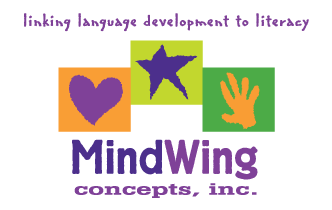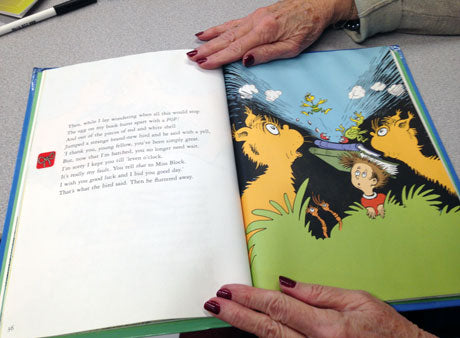Menu
-
- Home
-
About Us
-
The Approach
-
Linking Language & Literacy
-
MindWing Learning
-
Learning Resources
-
SHOP
-
Blog
-
- About MindWing
- Our People
- Contact Us
- Your Account
- Login
-
Spain (EUR €)

Feelings Activities with Dr. Seuss “Cat in The Hat” and “Marco Comes Late”
February 27, 2019 4 min read
 As you know, March 2nd is the birthday of Dr. Seuss. He was born right around the corner from our MIndWing office here in Springfield, MA. If you ever visit the area, be sure to make time to enjoy a trip to The Amazing World of Dr. Seuss Museum and the Dr. Seuss National Memorial Sculpture Garden located here in Springfield. You will find everything Seuss, and it is a trip that both young and old will enjoy!
As you know, March 2nd is the birthday of Dr. Seuss. He was born right around the corner from our MIndWing office here in Springfield, MA. If you ever visit the area, be sure to make time to enjoy a trip to The Amazing World of Dr. Seuss Museum and the Dr. Seuss National Memorial Sculpture Garden located here in Springfield. You will find everything Seuss, and it is a trip that both young and old will enjoy!
Yesterday, I visited the Springfield Library to get a copy of The Cat and The Hat so I could share a lesson suggestion related to feelings.
Along with that book, I found a copy of Horton and the Kwuggerbugs and Other Lost Stories. These stories were originally published in Redbook magazine between 1950-1955. Charles Cohen, a collector of all things Seuss, put together four of these selections in this book. Following The Cat and The Hat activity is an SGM analysis of one of those stories: “Marco Comes Late.”
So, it’s time to share
These two books with you,
I hope you enjoy them and
The children do, too!
 THE CAT IN THE HAT
THE CAT IN THE HAT
Materials:
- The Cat in the Hat
- Enlarged color copy of pages 36-37
- Emotions Bookmark from The Critical Thinking in Action! Set
- Braidy Feelings Checkers
- Copies of characters from the pages above
- SGM Mini Magnets
Small Group Lesson:
- Of course, read the book to the students and enjoy!
- Reread pages 36-37 (or any page(s) of your choosing)
- Set up the magnetic board with the pages, a Braidy Feelings Checker and characters (see photo below)…first the two children…
- Ask: “How do you think the children are feeling?” Invite one of the children to come up and circle “surprised” on the Feelings Checker.
-
Write the word “surprised” on the board and invite students to share when they have felt surprised.

-
Then, change the character to the Cat in the Hat and follow the same procedure as above, this time writing “happy” on the white board.

-
Put the bookmark up on the board and invite a student to come up and circle the synonyms for “happy.”

- List “glad,” “joyful” and “elated” as words that students could use instead of “happy.”
- Use the words in a sentence about the Cat in the Hat and ask students to do the same with a partner.
“MARCO COMES LATE”
This story is one of the Seuss stories published in the 1950s in Redbook magazine. It was “lost” because it had not been put into traditional print. Dr. Cohen, a dentist from nearby South Hadley, worked hard to find and collect Seuss literature and is responsible for the compilation of several of the Redbook stories in the book Horton and the Kwuggerbug and More Lost Stories! (Read about Dr, Cohen’s story.)
We chose “Marco Comes Late” since it is about school and something that could have happened on Mulberry Street, in Springfield! “I wonder…”
Materials:
- “Marco Comes Late”
- SGM Complete Episode Removable Stickers
- The Critical Thinking Triangle in Action! Set
- Student Story Grammar Markers
ACTIVITY
-
 Read the story for enjoyment.
Read the story for enjoyment. - Use the analysis below to outline the story with the students using the Complete Episode Removable Stickers to assist.
- Pair the students and ask students to retell the story using a Student SGM Marker.
ANALYSIS

- Character: Marco, a small boy and Miss Block, his teacher
- Setting: The entire illustration at the beginning of the book shows the characters and the school room setting. The time is 11:00. Using background knowledge about when school usually starts helps us to predict that Marco is late for SCHOOL…almost three hours late!
- Kick-Off: The kick-off for Marco is that when he gets to school late, Miss Block demands an Excuse. She says: “Why didn’t you come just as fast as you could? What IS your excuse? It had better be good!”
- Feeling: We infer that he feels scared (Miss Block is very stern.) since he can hardly speak. “Er…well…well, you see.”
- Mental State: He is thinking of something to say to Miss Block as an excuse. He thinks of a happening on his way to school along Mulberry Street: “Something happened to me.” Um….

- Plan: His excuse will be something that COULD happen on Mulberry Street where, as he walked to school each day, he saw things like worms and cats.
- Action: First, a bird laid an egg on his “rithmetic book” and he stood there unable to move so as not to knock the egg off.

- Action: Next, he heard two worms fighting about whether he should move and whether it is more important to save the egg or go to school. It was a terrible fight.
- Action: After that, two big cats argued too. The question was how Miss Block’s anger will lead to punishment for the boy.
- Action: Finally, he waited for the egg to hatch in fear amidst the shouting of cats and worms.

- Direct Consequence: As a result, the new bird did hatch. It was strange. The bird said: “I’m sorry I kept you till “leven o’clock. It’s really my fault. You tell that to Miss Block.” He does tell Miss Block.

-
Resolution: He feels satisfied with his excuse. “that’s my excuse and I think it’s quite good.”
Lesson Learned: He tells a made-up story for an excuse. He knows, when prodded by Miss Block, that it is not true. He tells her he did see a worm. He used his imagination and got out of trouble. Miss Block says: “Did all of those things really happen to you?” His truthful answer was that he did see a worm…. This is a book written for fun.
- Focus on the Critical Thinking Triangle® as shown in the pictures below.



Lesson Extension:
Invite the children to turn and talk, then share with their partner, then share aloud. What would YOU have told Miss Block?
Check out these previous blogs! Happy Birthday, Dr. Seuss!
Leave a comment.
Comments will be approved before showing up.

 THE CAT IN THE HAT
THE CAT IN THE HAT



 Read the story for enjoyment.
Read the story for enjoyment.